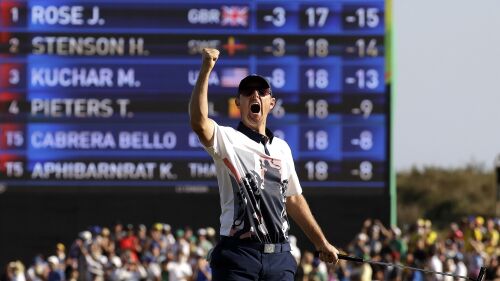KAWAGOE, Japan – For American audiences, this week’s Olympic men’s competition will have a familiar feel with many of the same faces, the same format, and because of COVID-19 restrictions the same vibe they get from a steady diet of PGA Tour stops.
This isn’t a criticism of golf’s status in the Games or American sensibilities. A medal, any medal, is worth celebrating. Ask any of the six golfers who took hardware home in 2016 when golf returned to the Games. But for golf savvy audiences, the status of Olympic golf compared to the game’s other top trophies really isn’t a contest. Majors, not medals, are what Americans put above all else.
Beyond the borders of the “golf” nations, however, a medal’s meaning transcends tradition.
If, for example, Collin Morikawa were to find his way onto the podium that medal would fit nicely alongside the Claret Jug and Wanamaker Trophy, but it’s probably not going to be life-changing.
Full-field scores from the Olympic Men’s Competition
But for many outside the United States and other “developed” golf countries, the conversation about majors versus medals is more convoluted.
“Winning a major is bigger, personally, and I think most people think that way and I think maybe the Norwegian people would interpret it that way, just based off of the reaction of other people,” explained Norway’s Viktor Hovland. “But people not knowing anything about golf and there are plenty of those people in Norway, I think would probably be more excited about an Olympic medal compared to a major because they might not know what a major is, but everyone’s heard of the Olympics and an Olympic medal carries a lot more weight than a major maybe does for some people.”
Even in countries where golf is an established sport, there are layers to the conversation that wouldn’t apply to many American fans.
“I mean, this is only once every four years. In my lifetime there’s not going to be too many gold medalists,” Australia’s Marc Leishman said. “As a golfer, I think we didn’t grow up thinking we would have a chance to win a medal, so I think as time goes on, this is going to get bigger and bigger and bigger. If it wasn’t equal to a major, it would be a very, very, very close second.”
In other places around the globe the comparison is not that close. Winning a medal in the Olympics resonates with the casual sports fan in places like Mexico, where golf remains a fringe sport.
“I mean they will know what the Masters is or the U.S. Open but they wouldn’t really know what it’s all about. But the Olympics, when you tell somebody you won a gold medal, they know exactly what you’re talking about,” Abraham Ancer said. “I think a gold medal would be huge just for the people that don’t know much about golf really.”
Carlo Ortiz, Ancer’s Team Mexico partner this week agreed. “Definitely a gold medal or any kind of medal for Mexico would be much bigger because you’re representing your country,” Ortiz said. “When you’re playing a major you’re just playing for yourself.”
In many countries, the Olympic status is baked into every aspect of society, like in South Korea where an Olympic medal, any medal, will earn a player an exemption from mandatory military service. To put that in context, Si Woo Kim’s three PGA Tour victories, which includes the 2017 Players Championship, won’t exempt him from service, but a third-place finish this week (bronze medal) will.
A green jacket or having your name etched into the Claret Jug will always rank among the game’s ultimate achievements, but there’s no ignoring what an Olympic medal would mean beyond golf.
“The Olympics are what the Americans would call a needle mover,” India’s Anirban Lahiri said. “All the masses watch. It’s what the government actually takes an interest in. Everyone has a stake in it. If I win a major on the PGA Tour it would be huge for the golf community in India, which isn’t the biggest. But if I can medal in the Olympics that transcends all sporting communities, everyone.”
Whether a medal ever reaches a similar level as a major for American audiences is likely a question that won’t be answered for at least another generation.
Having young players like Morikawa, Xander Schauffele and Justin Thomas commit to this year’s Games is a boost, but the high-profile no-shows – including then-world No. 1 Dustin Johnson and later Brooks Koepka and Patrick Cantlay after Bryson DeChambeau was forced to withdraw from the Games after testing positive for COVID-19 – is a telling reminder that the Games are still an outlier in golf.
At least in the United States.
But as this week’s competition proves that perspective is not universal.




